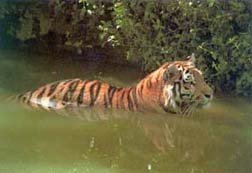News………….
The interactive features of IWC.com are getting more popular. The monthly quiz attracts almost a regular stream of members. Though we are no longer giving away any prizes for the quiz winner, the number of contestants are going up.
The online chat for January " Mangroves of India" moderated by Mr. Vivek Kulkarni attracted a good number of participants from all over the country. Thank you Mr. Kulkarni for inspiring a "Dil Se" ( from the heart) chat. You can read the chat
transcription by
clicking here.
Here are a few informative websites where you can get more information about our mangroves.
http://www.godrej.com/mangrove/index.htm
http://www.ramsar.org/w.n.india_11new.htm
http://www.ramsar.org/w.n.bangladesh_sundarbans.htm
 |
| A swimming Bengal Tiger is crossing a tidal creek in Bangladesh Sundarbans |
…………..& Views
"The magnitude of the problems facing our wildlife is so enormous that if we were to double our efforts overnight, it still would not be enough. Unless we the people of this nation become far more proactive and demand stronger
measures to protect and preserve what’s left, the government is not going to do very much more.
There are a few extremely vociferous and effective private organizations that are crusading tirelessly to preserve our forests and wildlife, but you can count them on the fingers of one hand. We need many more small effective
groups around each national park and wildlife sanctuary focusing on the problems of that area. And, most importantly, NGOs and wildlife authorities must work together to solve the complex problems that beset conservation…………."
" The level of wildlife and conservation awareness in this country is abysmal. Take the school and college curricula, for instance. Even zoology courses in colleges don’t deal seriously enough with these vital issues. Thank god
for television! By bringing wildlife into peoples’ drawing rooms, documentaries are helping sensitize people to the beauty of nature and the problems faced by wildlife around the world. It’s incredible how many people, even in remote villages, are now watching
nature programmes on Discovery Channel and National Geographic.
My personal approach to wildlife film making vis-à-vis television programmes has been to try and strike a balance between showing the beauty and wonder of nature, and the problems. There is a very fine line. Let’s face it, most
people watch television to be entertained. If you can make an entertaining wildlife programme and slip in a few poignant messages there is a greater chance of acceptance by the audience. Depress them too much and they’ll just change channels. Also, I think
it is important to leave people, particularly the younger generation, with a sense of hope. Wildlife conservation is an uphill battle, but it is not a hopeless one. There is so much in this country that is still worth preserving, still worth fighting for.
……………….."
"A film seen by 50 empowered people is far more effective than a film seen by 50 million passive television viewers"…….
Award-winning wildlife filmmaker and conservationist
Shekar Dattatri about film making and conservation